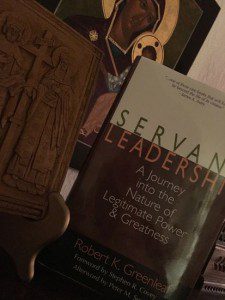 For each of our (now adult) children, we had a “lesson.” For one it was: it is more important to be beautiful on the inside than the outside. So powerful was this lesson that this child became staggeringly beautiful on the inside and the outside. For another child, one lesson was: If I am humble, I will not stumble.
For each of our (now adult) children, we had a “lesson.” For one it was: it is more important to be beautiful on the inside than the outside. So powerful was this lesson that this child became staggeringly beautiful on the inside and the outside. For another child, one lesson was: If I am humble, I will not stumble.
I did not claim these were profound or great poetry. I am John Reynolds not John Donne.
As this youngling learned his lesson, we discovered that humility is not wisely prized. We seek “self-esteem” not self-abasement. Our idols point to self or if they point to God or others, they make it sound as if the Almighty was blessed to be allowed to bless them. As a result, this child became (for good reason) skeptical about the value of humility.
We had to define our terms. Culture was teaching the kid that humility meant lying: saying you were bad at something when you were obviously good. We had to point out that one cannot reach a virtue, humility, through a vice, lying. He also suspected that humility meant feeling bad for no good reason . . . and that too was wrong. You should not feel bad for something you did not do and feeling bad is not the point in any case. If I feel bad for something I did, that is fine, but only if I am motivated to change or make restitution.
God doesn’t want us to feel bad . . . He wants us to have joy. We only feel bad, because our sins and mistakes separate us from joy.
Humility is knowing who you are and your proper place in the cosmos. Christians have always known that the cosmos is large and we are not. (By the way, anyone who suggests that Christians did not know this until modern times is semi-literate at best. Send them to Dante.) Second, I am broken in myself. There are things I know to do (be on time to the airport) and yet I do not do them (stressing out the Fairest Flower in all Christendom). These are mistakes that shade into moral failings, but there are also pure moral failings: when I have illicit desire, covet, or hate.
I am broken: should and is do not agree.
And yet I do not despair, because God is merciful. He does not just “forgive and forget,” but God is changing me so that I am different than I was.
Mary is the model of humility. She knew that she was God’s servant, but also that God had called her to the highest status any human could have: mother of God. She was not blessed for having a womb and being able to be a mother, but because she heard God’s word and said “yes.” She knew her place and that her status would be full of pain and glorious. Humility saw Mary pierced in the heart when her Son was killed by bad men, but then exalted to highest heaven when her Son was exalted. She is not God or equal to God, but she said an absolute “yes” to becoming good, true, and beautiful.
Humility, being humble, will keep us from stumbling. The humble man cannot be shaken by fate, because the humble man is secure in his place. He knows the person God made him to be and that God will make that a reality. We are sons and daughters of God. God loves us. We are broken and we cannot fix ourselves, but God can and will. These are truths that put us in our place: we are small, broken, and loved! The truth makes me exalt and feel sorrowful: sorry for my sins, ecstatic in the good that God has given me and is doing in me.
Hoopla! Jesus is Lord! I am his servant and yet His brother. If I am humble, I will not stumble. Hurrah!










